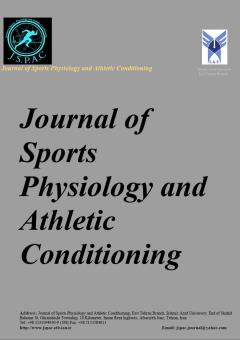The effects of aerobic exercise and Pistacia vera hull ethanol extract on the expression of superoxide dismutase in rats on a high-fat diet.
Subject Areas : Sport Physiology
Hadi Barshan
1
,
Mohammad Ali Azarbayjani
2
*
![]() ,
Saleh Rahmati
3
,
Maghsoud Peeri
4
,
Saleh Rahmati
3
,
Maghsoud Peeri
4
1 - Department of Sport Physiology, Central Tehran Branch, Islamic Azad University, Tehran, Iran
2 - Department of Sport Physiology, Central Tehran Branch, Islamic Azad University, Tehran, Iran
3 - Department of Exercise Physiology, Pardis Branch, Islamic Azad University, Pardis, Iran
4 - Department of Exercise Physiology, Central Tehran Branch, Islamic Azad University, Tehran, Iran
Keywords: Pistacia vera hull ethanol extract, SOD, aerobic exercise , obesity,
Abstract :
Background: During aerobic metabolism, skeletal muscle produces significant amounts of superoxide anion due to electron leakage from the mitochondrial electron transport chain. Superoxide dismutase (SOD) enzyme is one of the most critical enzymes for neutralizing reactive oxygen species. However, obesity weakens an antioxidant defense system, especially SOD, and obese people are more sensitive to oxidative damage. Aerobic exercise and medicinal plants can reduce obesity-induced oxidative stress in skeletal muscle tissue. Since the effect of aerobic exercise and pistachio peel extract on SOD gene expression has not been investigated, the present study intends to investigate the effect of aerobic exercise and Pistacia vera hull ethanol extract (PVHEE)on SOD gene expression in rats fed a high-fat diet.
Materials and Methods: In an experimental study, 30 young female Wistar rats aged 12 weeks and weighing 180-200 grams were selected as subjects and randomly divided into 5 groups (n=6 in each group), including control Normal diet, high-fat diet control, aerobic exercise, receiving PVHEE, aerobic exercise and receiving PVHEE were divided. The program of aerobic training was four weeks and five sessions of running on the treadmill for rodents in the range of 50-60% Vo2Max. Sixty milligrams per kilogram of body weight of ethanol extract of pistachio skin were fed to rats by gavage for four weeks and five times a week. Following completion of the interventions, soleus muscle tissue was removed to determine SOD gene expression by real-time PCR.
Results: SOD gene expression in the group fed high-fat diet was significantly lower than in the group fed normal diet (p=0.0001). Four weeks of aerobic exercise (p=0.04), PVHEE (p=0.02) and the combination of aerobic exercise - PVHEE (p=0.0001) caused a significant increase in SOD gene expression compared to the control group. The highest SOD expression was observed in the aerobic exercise and PVHEE group.
Conclusion: The results obtained from the present study showed that feeding with high-fat diet weakens the enzymatic antioxidant defense system of skeletal muscle by reducing SOD gene expression. Both aerobic exercise and PVHEE can prevent the weakening of the antioxidant defense system of muscle tissue. This will reduce skeletal muscle oxidative damage.

